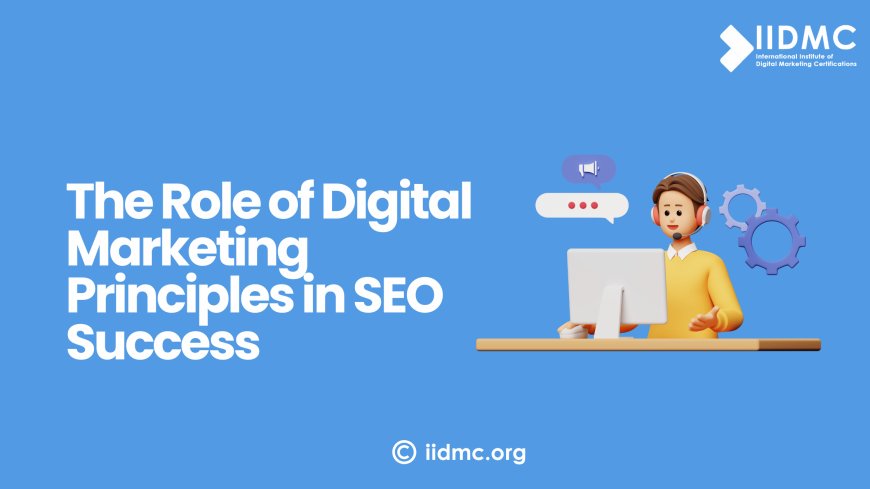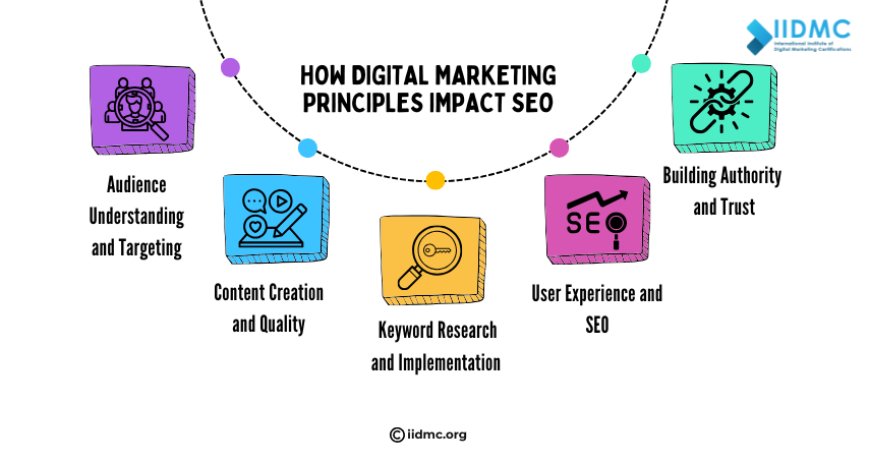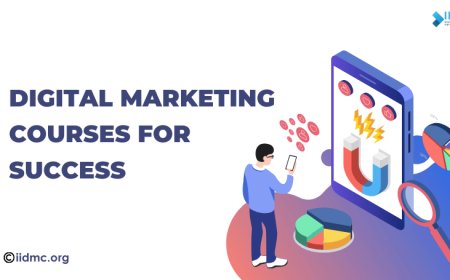The Role of Digital Marketing Principles in SEO Success
Discover how digital marketing principles drive SEO success. Learn key strategies to enhance search rankings, boost website traffic, and optimize your online presence.

When I began to learn about SEO, I struggled to understand how SEO techniques fit into the bigger picture of digital marketing. To help with this, I decided to join a certificate program at IIDMC that covered the fundamentals of digital marketing. What stood out to me was how these fundamentals were key to creating a solid SEO strategy. Understanding audience behavior, creating valuable content, and enhancing websites weren’t just tricks for SEO; they were essential concepts in digital marketing. Once I started using these strategies in my projects, I noticed my website's rankings getting better over time. It became clear that focusing on digital marketing principles was vital for my success in SEO.
Search engine optimization is super important for making your business stand out online. So, what makes SEO work well? It all comes down to some key ideas in digital marketing. These ideas include knowing your audience, making interesting content, and improving how users experience your site. Together, these principles are the foundation of a strong SEO plan. They help increase your website's visibility and improve its ranking in search results. Rather than looking for quick solutions, these digital marketing principles help businesses build effective, long-lasting SEO strategies that pay off.
What is digital marketing?
Digital marketing is the use of online channels and strategies to promote products, services, or brands to a target audience. It includes tactics like search engine optimization (SEO), social media marketing, email marketing, content marketing, and paid advertising. By leveraging digital platforms such as websites, social media, and search engines, businesses can reach and engage with customers more effectively. Digital marketing offers a cost-efficient way to track performance, target specific audiences, and adapt strategies in real time for better results.
What Are Digital Marketing Principles?
The essential guidelines and strategies that help businesses build a strong online presence. These principles are rooted in understanding the audience, crafting valuable content, optimizing websites for user experience, and fostering engagement. By applying these principles, businesses can align their marketing efforts with SEO goals, ensuring that their website is visible, user-friendly, and attractive to both users and search engines. When combined with SEO techniques, these principles enhance search engine performance and drive long-term results.
How Digital Marketing Principles Impact SEO
Digital marketing principles enhance SEO by ensuring content aligns with audience needs, boosting engagement and dwell time. They emphasize the importance of quality content creation, which helps improve search rankings. Additionally, these principles guide optimizing user experience, making websites more accessible and appealing to both users and search engines.
1. Audience Understanding and Targeting
One of the fundamental aspects of digital marketing is understanding and targeting the right audience. SEO success depends heavily on whether your content resonates with your target market. By identifying what your audience is searching for and crafting content that meets their needs, you’re not only improving user engagement but also increasing your chances of ranking higher on search engines. Tailoring your content to meet user intent ensures that you attract quality traffic, which is a key factor in SEO success.
2. Content Creation and Quality
Content plays a pivotal role in both digital marketing and SEO. High-quality, relevant, and engaging content helps businesses establish authority and trust, which are key factors in SEO rankings. Content should not only include well-researched keywords but also provide value to the reader. By focusing on producing informative and engaging content that answers users' questions, you increase dwell time and reduce bounce rates—both crucial for SEO. In short, valuable content is rewarded by search engines and is a cornerstone of effective digital marketing.
3. Keyword Research and Implementation
Effective keyword research and implementation are essential aspects of both digital marketing and SEO strategies. Identifying the right keywords that align with your audience’s search behavior is crucial. But keyword optimization is not just about stuffing them into your content. Instead, it guides the use of keywords in a way that enhances the reader’s experience, integrates them naturally into the content, and avoids overoptimization. A well-balanced keyword strategy helps improve your visibility without compromising the quality of the content.
4. User Experience and SEO
User experience (UX) is an increasingly important factor in SEO rankings. A website that is easy to navigate, loads quickly, and works well across all devices keeps visitors engaged and reduces bounce rates. Search engines prioritize websites that offer a smooth user experience. By creating intuitive site structures, using clear calls to action, and ensuring fast page load times, you can enhance your website’s SEO performance.
5. Building Authority and Trust
Building authority and trust are core digital marketing principles that directly influence SEO rankings. Search engines like Google prioritize websites that are seen as authoritative and trustworthy. This is often achieved through high-quality content, backlinks from reputable sources, and consistent audience engagement. A strong content strategy that adheres to these principles helps your site gain credibility over time, which is reflected in improved SEO rankings. When search engines recognize your website as a trusted source, they are more likely to rank your content higher.

The Importance of Content Marketing in SEO
Content marketing is one of the most important digital marketing principles when it comes to SEO success. Well-crafted content that provides value to the reader can significantly impact how search engines rank your website. By consistently producing high-quality content—whether it’s blog posts, videos, infographics, or case studies—you’re not only keeping your audience engaged but also giving search engines more reasons to crawl and index your site. This boosts your overall visibility and authority, which leads to better SEO results.
1. Long-Form Content and SEO
Long-form content tends to perform better in search engine rankings, as it allows for in-depth exploration of a topic, which adds value to the user. Digital marketing principles support the creation of detailed, informative content that answers users' queries comprehensively. In turn, this type of content increases dwell time on the page, reduces bounce rates, and signals to search engines that your site is providing value—all key factors for SEO success.
2. Consistency in Content Production
Consistency is another critical digital marketing principle. Regularly updating your website with fresh, relevant content keeps your audience engaged and signals to search engines that your site is active. Whether it's through blog posts, product updates, or case studies, consistently delivering content helps improve SEO rankings over time. Search engines favor websites that are frequently updated, as it shows that they are a reliable source of information.
How Digital Marketing Principles Support Technical SEO
Technical SEO is the foundation that ensures your website is accessible and optimized for search engines. While technical aspects like site speed, mobile friendliness, and proper indexing are crucial, they should be implemented alongside essential strategies. For instance, optimizing images, creating meta descriptions, and ensuring proper internal linking are all part of both technical SEO and broader marketing strategies. By blending these approaches, businesses can ensure that their website is not only user-friendly but also search engine-friendly.
The Role of Backlinks in Digital Marketing and SEO
Backlinks are a key SEO ranking factor, and they align with digital marketing principles that focus on building authority and trust. When your website earns backlinks from high-authority domains, it signals to search engines that your content is valuable and trustworthy. However, earning these backlinks requires the implementation of strong digital marketing strategies, such as creating shareable content and building relationships with industry influencers. By focusing on the quality of backlinks rather than quantity, you can ensure that your SEO efforts are sustainable.
1. Quality over Quantity
While it might seem tempting to gather as many backlinks as possible, digital marketing principles emphasize the importance of quality over quantity. A few high-authority backlinks from trusted sources can have a much greater impact on your SEO than dozens of low-quality links. Focusing on building meaningful, valuable connections in your industry will improve your site’s authority and help you achieve long-term SEO success.
Measuring SEO Success Through Analytics
One of the core digital marketing principles is data-driven decision-making. In SEO, this means continuously monitoring your site’s performance and making adjustments based on what the data shows. Tools like Google Analytics and Search Console provide insights into how your website is performing, including metrics such as organic traffic, bounce rates, and keyword rankings. By analyzing this data, you can identify areas of improvement and refine your strategy to ensure that your efforts in digital marketing and SEO are aligned.
The synergy between digital marketing strategies and SEO is undeniable. By focusing on understanding your audience, creating high-quality content, optimizing the user experience, and building trust and authority, businesses can achieve lasting SEO success. At IIDMC, these strategies are at the heart of the digital marketing training provided, ensuring that students not only grasp SEO tactics but also the broader strategies needed to thrive in the digital world.
For businesses looking to boost their online presence, it’s clear that following these strategies is essential for long-term SEO success. They form the foundation for creating a sustainable strategy that not only improves rankings but also delivers real value to users. By adopting this holistic approach, businesses can stay competitive and continuously grow their digital footprint.





























